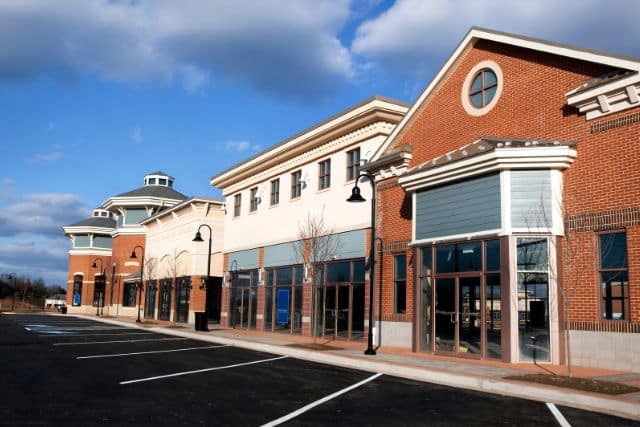A commercial real estate loan (CRE) helps businesses finance their expansions, whether buying, improving, or renovating properties for commercial purposes.
Unlike residential loans given to eligible individuals to build or develop personal residences, business entities, or owners can apply for lending specifically for income-producing ventures such as:
- Hotels
- Office buildings
- Apartment complexes
- Shopping centers or retail stores
- Restaurants
- Industrial buildings
- Warehouses
While commercial real estate loans tend to be higher in value than residential loans, they typically have steeper interest rates, making them more expensive to repay. Commercial real estate loans usually have shorter terms, unlike conventional 15-30-year mortgages on residential properties.
Financial institutions like banks, lending and insurance companies, private investors, and other government-backed lenders like the U.S. Small Business Administration (SBA) offer CRE loans. Loan requirements vary from one lender and loan type to another. The typical factors that lenders look for include the following:
- Business income and expense trends
- Personal and business credit scores
- Debt service coverage ratio
- Balance sheet
- Overall financial performance
- Borrower payment history
Interest Rates and Loan Qualifications
Interest rates and qualifications for commercial real estate loans may vary. Every lender will view your deal differently, depending on the financial health of your company, what kind of property is being acquired, and the structure you borrow under.
Here’s a quick look at what you can generally expect:
- Interest Rates:
Most commercial real estate funding options range from 5% to 12% interest, depending on the loan and lender. Long-term financing, conventional commercial mortgages, or SBA loans, tend to have lower, steady rates and are best for proactive businesses. Short-term options, however, such as bridge or hard money loans, have higher rates because they’re designed for quick access to funds and involve a bit more risk. - Down Payments:
Borrowers typically would expect to pay 20% to 30% down on the property value. Higher is requested by some commercial property lenders when the business is newer or has little cash flow history. - Credit and Financials:
Lenders will look at both personal and business credit ratings, with at least a 660–680 rating usually sought. They’ll also look at your business revenues, expenditures, and cash reserves. Maintaining a good debt service coverage ratio (DSCR), more than 1.25, will provide evidence that you’ll be able to repay the loan. - Documentation:
Be ready with key documents like tax returns, balance sheets, profit and loss statements, rent rolls, and a solid business plan that outlines how the property will generate income.
Understanding these basic requirements helps you prepare before applying and improves your chances of landing better terms with the right commercial real estate lenders.
Types of Commercial Real Estate Loans
Commercial real estate loans are categorized into long- and short-term loans. The various options under each category have different terms, rates, requirements, and purposes. Business owners and commercial entities can choose which type best fits their needs.
Long-Term Commercial Real Estate Loans
Like traditional residential loans, long-term CRE loans offer 5-25-year repayment terms. They can be used for construction, property purchases, and development. Learn more about the processes for getting a CRE loan.
- Traditional Commercial Mortgages
Commercial mortgage loans are comparable to residential mortgages because they have similar, longer repayment schedules ranging from 15 to 20 years. Getting approved for commercial mortgage loans is typically more challenging because of the stringent requirements and stricter approval process.
Banks and other lending institutions are generally cautious before loaning large amounts to companies because they understand the risks involved. They require high personal and business credit scores and proof that businesses create enough revenue to repay loans. The tradeoffs are lower interest rates and higher loan-to-value ratios than other types.
- Small Business Administration (SBA) Loans
Small business owners can apply for SBA loans to finance expansion, property purchases, and improvements. They are popular among borrowers due to their flexibility and longer payback schedules. The two most common SBA loans are:
- 7(a) loans: Businesses can use this loan to build working capital with a variable interest rate. It’s ideal for companies that must buy supplies, procure additional equipment, or fill gaps in their cash flow.
- 504 loans: 504 loans offer fixed-rate financing for real estate purchases or improvements. This SBA loan is ideal for purchasing, renovating, or leasing properties, buildings, or equipment.
Businesses must meet specific criteria to qualify for different commercial real estate lending types under the SBA umbrella. Interested parties can refer to the U.S. SBA program to see which loan program suits their needs and capabilities.
Short-Term CRE Loans
Short-term loans are perfect for borrowers who fail to qualify for long-term commercial real estate lending programs and businesses that need financing quickly for their projects.
3. Bridge Loans
Bridge loans provide quick coverage for borrowers who must upgrade to smart building systems or do minor renovation projects for their real estate properties. They are payable in shorter periods, typically six months to three years. This type is ideal for borrowers who need to fill in gaps in their financing while waiting for their long-term loans to be approved.
The application and approval process for bridge loans is much faster since lending companies process smaller amounts than traditional commercial loans. Due to their shorter repayment nature, they usually have higher interest rates than long-term CRE loans. Borrowers must weigh their repayment capabilities before taking on higher-interest bridge loans.
4. Commercial Construction Loans
Construction loans are geared toward building commercial structures and renovating existing properties. Credit unions and banks typically offer them to businesses that want to develop income-producing buildings from the ground up. Unlike traditional commercial loans, this short-term option often releases funds in a staggered manner instead of single lump-sum payments.
Construction loans have short terms, ranging from 6-24-month periods, and cover various expenses necessary to build commercial properties. Some of these include the following:
- Labor costs
- Renovations
- Construction materials
- Professional fees for architecture, appraisal, design, etc.
- Landscaping services
- Subcontractors
- Permanent fixtures
5. Hard Money Loans
Business owners strapped for cash can choose to apply for hard money loans because of their quick turnaround time and convenient application process. This short-term loan bypasses the lender route and is typically issued by private lending companies and individuals.
Hard money loans have a higher interest rate than long-term financing programs. Lenders that offer them typically only need a little proof of repayment capabilities. Private lenders are more interested in the property’s value set up as collateral since they can recoup losses by selling it if a borrower cannot pay the debt.
How to Apply for a Commercial Real Estate Loan
Approval for commercial real estate financing does not have to be painful. With a little preparation and the right tools, you can make the process seem a whole lot easier, even pleasurable, as you take your business to the next stage. Here is a simple map to lead you along the journey:
1. Define Your Goals
Start by determining exactly how you’re going to use the loan. Are you buying a new office building, opening a new store, or renovating an existing building? Having your objectives in mind when you begin makes it easier to narrow down the commercial real estate loans that will fit your objectives and your budget.
2. Review Your Financial Health
Before you apply, take a quick pulse check on your finances. Look at your credit score, business income, and debt service coverage ratio (DSCR). Having your numbers in order tells commercial real estate lenders you’re serious — and ready to handle repayment with confidence.
3. Compare Lenders and Terms
Do not leap at the first offer that comes your way because rates, fees, and repayment terms vary with commercial real estate lenders. By shopping around for a little while, you might save a few thousand dollars and some headaches.
4. Submit Your Application
Once you’ve found the right lender, it’s time to apply. Keep your documents neat and ready to go. Using digital tools — like accounting apps or the best property management software — makes it much easier to stay organized and track your income, expenses, and property details throughout the process.
5. Close and Manage Your Loan
When your loan is approved, celebrate a little — then focus on managing your new property efficiently. Great property management software can help you handle rent collection, maintenance, and financial reporting all in one place. Staying on top of these details not only protects your investment but also makes it easier to qualify for future commercial property financing when the time comes.
A little preparation (and the right tech) goes a long way in simplifying your commercial real estate financing journey. Stay organized, take your time comparing options, and use smart tools to keep your investments running smoothly — you’ll be set up for success from day one.
Commercial Real Estate: A Balancing Act in Modern Business
Commercial real estate lending can significantly help expand business reach and potential. While loans are generally valuable tools, borrowers should weigh their options and capabilities to ensure profitability and stability. Even more importantly, after purchasing their property, they should take great pains to track their entire portfolio, including loans, to facilitate easier loan approval in the future.






